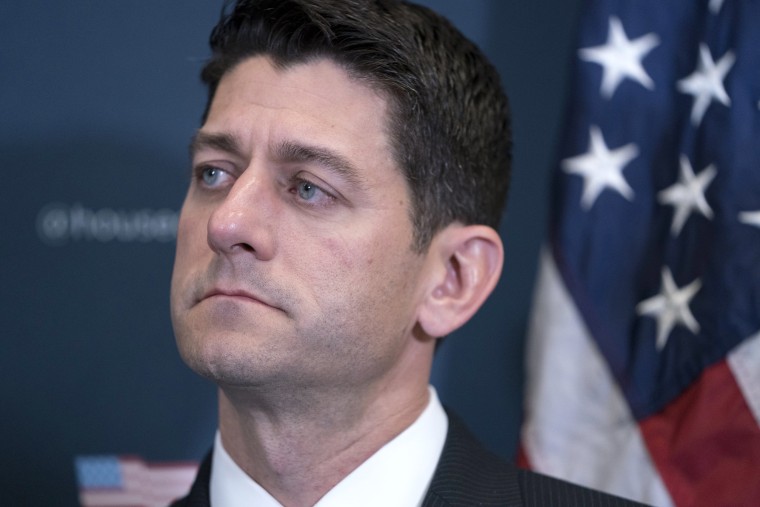Following former FBI Director James Comey’s highly anticipated testimony before the Senate Intelligence Committee Thursday, Senate Republicans offered a series of cautious defenses of President Donald Trump.
Democrats, meanwhile, said Comey's testimony proves that the investigation is just in its beginning phases and that Comey raised more questions than he answered, including some surrounding Attorney General Jeff Sessions. Intelligence Committee members learned in a closed session about a possible third meeting involving Sessions and the Russians, sources tell NBC News.
“Jeff could add a lot of light to it as to why he recused himself,” Sen. Joe Manchin, D-W.V., a member of the Intelligence Committee, said. “There’s one meeting we don’t know about and people would like to know about it.”
Comey appeared before the Senate Intelligence Committee one month after Trump fired him. During his testimony, Comey said he felt pressured by Trump to halt an FBI investigation into former National Security Adviser Michael Flynn during a series of private meetings and that Trump lied about him and his leadership at the bureau.
Related: Did Donald Trump Obstruct Justice?
Republicans mostly refused to defend the president’s conduct in his interactions with Comey but said nothing revealed in Thursday's hearing revealed any involvement with Russia or obstruction of justice — two of the most serious issues raised by the clash between the president and the former director.
Some Republicans pointed to Trump’s unfamiliarity with government as a reason for his handling of Comey.
“The president's new at this. He's new to government. And so, he probably wasn't steeped in the long-running protocols that establish the relationships between DOJ, FBI and White Houses. He's just new to this,” House Speaker Paul Ryan told reporters at his weekly news conference Thursday morning. After being pressed, Ryan added: “I'm not saying it's an acceptable excuse. It's just my observation.”
Sen. Marco Rubio, R-Florida, and member of the Intelligence Committee made a similar point after Comey’s testimony.
“I think it boils down to this — is this the action of someone putting together a plan to impede an investigation? Or is this a non-politician, unconventional figure, who simply operates in ways that are different from previous presidents? And no one has either informed him, or he’s been unwilling to be informed about why the kinds of requests that he made would be inappropriate,” Rubio said.
Rubio added that both scenarios are inappropriate, but one has more consequences than the other. Ignorance is problematic but intentional interference would more likely mean obstruction of justice. “That is the fundamental question that people are seeking to answer,” Rubio said.
Senator Lindsey Graham, R-S.C., who has had a complicated relationship with Trump, said that he doesn’t think that Comey’s testimony revealed any more wrong-doing by Trump. But he said Trump is guilty of bad judgement.
“If being crude, rude and a bull in a china shop a crime, Trump would get the death penalty. It’s not,” Graham said.
While Republicans cautiously came to Trump’s defense, they left room to reverse course as both the Senate Intelligence investigation and that of the Special Counsel appointed by the Justice Department unfold.
“He’s not under investigation for collusion yet. Keep investigating; we’ll see where it goes,” Graham also told reporters Thursday afternoon. “You start with Whitewater and you end up with a blue dress.”
Related: Comey Says White House Lied 'Plain and Simple' About Firing
One of Trump’s biggest defenders, Sen. John Cornyn, R-Texas, who was also being considered to replace Comey as FBI director until Cornyn withdrew his own name, said that Comey’s testimony cleared the president from the specter that he’s a part of the probe.
“He said there was no investigation of the president by the FBI. He said that three times,” Cornyn, who is also a member of the Intelligence Committee, said.
Democrats, meanwhile, said that Comey’s testimony showed a president who doesn’t respect the office or the law.
“Well I think we saw confirmation in Director Comey’s resolute testimony detailing the frightening reality of President Trump’s pattern of contempt for justice, his pattern for concerted and inexcusable efforts to shut down the FBI’s investigation of his cronies, ties to Russia — and all of that I think disgraces the office of president,” Pelosi said.
Democrats mostly said that his testimony revealed that more questions than answers.
Democrats also say that Comey’s testimony was specifically prepared to help Special Prosecutor Robert Mueller’s investigation.
“I think it’s a stage for the special counsel,” Sen. Bill Nelson, R-Florida, said.
"We don’t have all the facts yet. You have to dig for them and do a lot of analysis," said Sen. Dianne Feinstein, D-Calif., said. "You have evidence of collusion? Right now no. Not that I would call sufficient. Suspicions is one thing. Evidence is another."
Members want more information. Lawmakers want to see the rest of the memos Comey wrote after his meetings with Trump, and members of the Senate Judiciary Committee said they want Comey to appear before their committee as well.
As the investigations surrounding the Trump campaign ramp up, Democrats said that it's becoming more difficult for Republicans stand by the president.
“I think it becomes harder and harder for the president’s apologists to pretend this isn’t exactly what it looked like. It’s not beyond any credibility to find a charitable explanation for this,” Sen. Brian Schatz, D-Hawaii, said. “Whether it meets a certain legal standard or not remains to be investigated and determined.”

